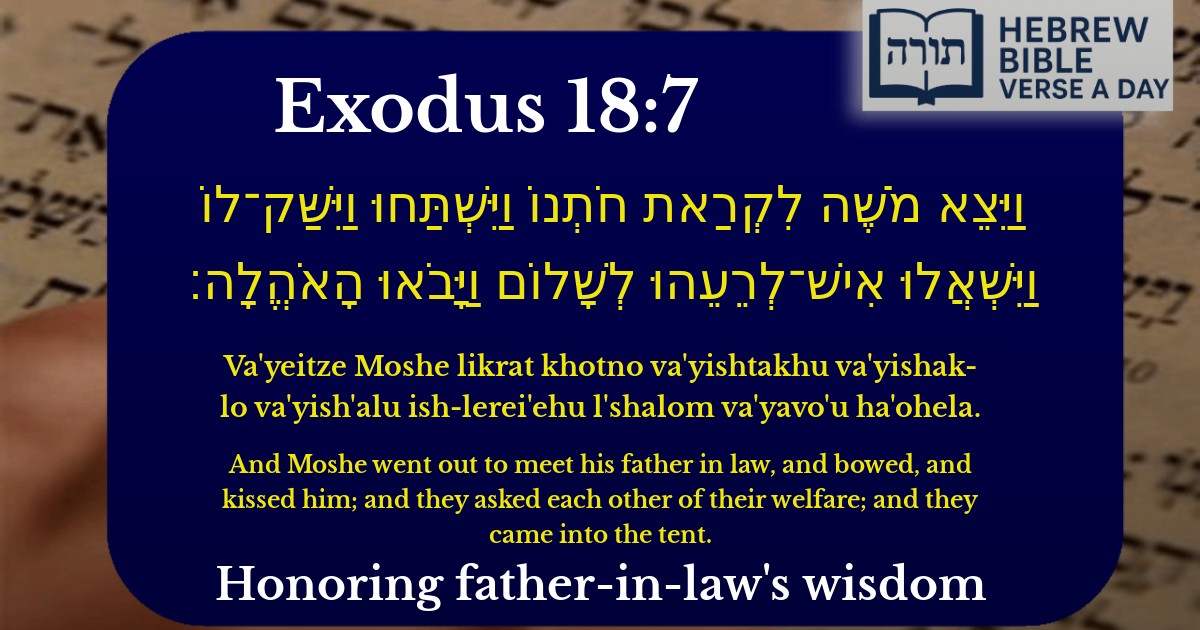Join Our Newsletter To Be Informed When New Videos Are Posted
Join the thousands of fellow Studends who rely on our videos to learn how to read the bible in Hebrew for free!
Hebrew Text
וַיֵּצֵא מֹשֶׁה לִקְרַאת חֹתְנוֹ וַיִּשְׁתַּחוּ וַיִּשַּׁק־לוֹ וַיִּשְׁאֲלוּ אִישׁ־לְרֵעֵהוּ לְשָׁלוֹם וַיָּבֹאוּ הָאֹהֱלָה׃
English Translation
And Moshe went out to meet his father in law, and bowed, and kissed him; and they asked each other of their welfare; and they came into the tent.
Transliteration
Va'yeitze Moshe likrat khotno va'yishtakhu va'yishak-lo va'yish'alu ish-lerei'ehu l'shalom va'yavo'u ha'ohela.
Hebrew Leining Text
וַיֵּצֵ֨א מֹשֶׁ֜ה לִקְרַ֣את חֹֽתְנ֗וֹ וַיִּשְׁתַּ֙חוּ֙ וַיִּשַּׁק־ל֔וֹ וַיִּשְׁאֲל֥וּ אִישׁ־לְרֵעֵ֖הוּ לְשָׁל֑וֹם וַיָּבֹ֖אוּ הָאֹֽהֱלָה׃
וַיֵּצֵ֨א מֹשֶׁ֜ה לִקְרַ֣את חֹֽתְנ֗וֹ וַיִּשְׁתַּ֙חוּ֙ וַיִּשַּׁק־ל֔וֹ וַיִּשְׁאֲל֥וּ אִישׁ־לְרֵעֵ֖הוּ לְשָׁל֑וֹם וַיָּבֹ֖אוּ הָאֹֽהֱלָה׃
🎵 Listen to leining
Parasha Commentary
📚 Talmud Citations
This verse is quoted in the Talmud.
📖 Sanhedrin 58b
The verse is referenced in a discussion about the proper way to greet a father-in-law, illustrating the respectful behavior of Moses towards Yitro.


Moshe's Respect for Yitro
The verse (Shemot 18:7) describes Moshe's actions upon meeting his father-in-law, Yitro. Rashi explains that Moshe "went out" to greet Yitro, demonstrating great honor by personally meeting him outside the camp. This act reflects the principle of kibud av va'em (honoring parents and elders), as Yitro was both Moshe's father-in-law and a respected elder. The Midrash Tanchuma (Yitro 3) further emphasizes that Moshe's bowing and kissing Yitro were expressions of deep reverence, setting an example of proper conduct toward one's elders.
The Significance of Asking About Welfare
The phrase "vayish'alu ish l're'ehu l'shalom" ("they asked each other of their welfare") highlights the importance of shalom (peace) and interpersonal relationships. Rambam (Hilchot De'ot 6:3) teaches that inquiring about another's well-being is a fundamental aspect of derech eretz (proper conduct). The Talmud (Berachot 64a) states that shalom is so vital that even Hashem altered the truth for the sake of peace (as seen with Sarah and Avraham). Here, Moshe and Yitro model this ideal by exchanging greetings before discussing weightier matters.
Entering the Tent: A Symbol of Unity
The conclusion of the verse—"vayavo'u ha'ohela" ("they came into the tent")—is interpreted by the Kli Yakar as symbolic of entering into meaningful dialogue. The tent represents a private space for Torah discussion, foreshadowing Yitro's subsequent advice to Moshe about establishing a judicial system (Shemot 18:13-26). The Sforno adds that this moment underscores the value of welcoming wise counsel, as Yitro's later suggestions were accepted by Moshe with humility.